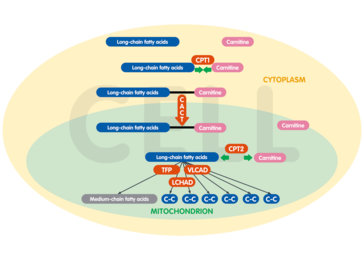

Diagnosis LCHAD - Our story
The pregnancy with my second child went without any complications, apart from the fact that our second child also seemed to be quite big in terms of length and weight[...] The birth was completely uncomplicated and everything went well for our little family. The only strange thing was a situation that we only realized afterwards as the first crisis...
The Birth
The pregnancy with my second child went smoothly, except for the fact that our second child also seemed to be on the larger side in terms of length and weight. However, we were already accustomed to this from our firstborn. My obstetrician insisted I take the gestational diabetes test, which came back negative. Once that was clarified, I chose to have the final weeks of my pregnancy monitored exclusively by my midwife. Similar to my first child, my daughter was born at home. The birth was entirely uncomplicated, and everything went well for our little family.
In retrospect, we identified an unusual incident that marked our first crisis. A few hours after birth, Martha, as we lovingly named her, was in her cradle and began trembling. Upon bringing her to me and placing her on my breast, the trembling miraculously ceased. Throughout our initial night together, Martha displayed remarkable vigor, loudly and persistently demanding to be nestled at the breast. This marked the beginning of her spirited personality.
These early moments with Martha were both memorable and unique, setting the tone for the beautiful journey that lay ahead for our family.
From the beginning, we only directed as much attention to the genetic uniqueness as each situation required. Otherwise, we continued with our normal life as much as possible, partly influenced by the presence of our older sibling.
The Newborn Screening
A few days later, our midwife conducted the newborn screening, during which blood was drawn from the baby's foot. Initially, we had debated whether to proceed with the test, but an indistinct gut feeling told me that we should go ahead with it. The dried blood spot card was filled out and sent away. Since postal services were on strike at the time, our card arrived at the laboratory several days later. We had already forgotten about the test when one evening, Martha was already 14 days old, we received a call. The newborn screening revealed abnormalities, and we were instructed to present ourselves at the children's hospital the next morning with a packed bag. They were expecting us when we arrived.
Upon entering the crowded outpatient clinic, we were immediately ushered through. Blood was drawn from a spot on Martha's head, which was particularly painful for me. Subsequently, we were rushed to the metabolic outpatient clinic in an ambulance with flashing lights. Everything happened so quickly that we didn't even have time to wonder about this unusual situation. Only in hindsight did I realize how critical that moment was.
Upon arriving at the metabolic outpatient clinic, I had to bid farewell to my firstborn, who, as a toddler, was not allowed access to the station. My daughter and I were assigned a private room, blood values were checked and analyzed, and an initial consultation with a doctor followed. I remember nursing her when they called us for the discussion.
Medical consultation - initial diagnosis
As the genetic examination results were not yet available, the initial suspicion pointed towards VLCAD deficiency, which, as the doctors explained, would entail less stringent dietary restrictions. The physicians based this initial assumption on Martha's good health condition, as she had been exclusively breastfed until that point and showed no abnormalities. Later, we learned that Martha actually had LCHAD deficiency. I am still grateful that our doctor informed us about Martha's chronic condition back then. She was able to explain the fatty acid oxidation disorder in an understandable way and demonstrated openness and flexibility in handling our situation. This made me feel understood and well-supported. Above all, it was crucial to me that I could continue breastfeeding my daughter.
Therefore, we embarked on an attempt to feed Martha half through breastfeeding and the other half through special formula with a high content of MCT fats. At that time, I was not aware that for a doctor, this represented stepping outside their 'medical comfort zone,' as we were, in fact, the first to carry out this endeavor. Martha handled it all well – she seemed indifferent to the source of the milk. It benefited us all that she had always been a good drinker and later became a good eater.
Getting a grip on life again
Despite all the crises and uncertainties, looking back we have been incredibly lucky on many occasions and our family has been able to adapt well to our very special situation. Right from the start, we only paid as much attention to the genetic peculiarity as the situation required. Apart from that, we continued to live our normal lives as best we could, partly because of the older sibling. Although we quickly got our lives back on track, it would have been very helpful to have psychological support at our side, as we reached our limits in many situations.




